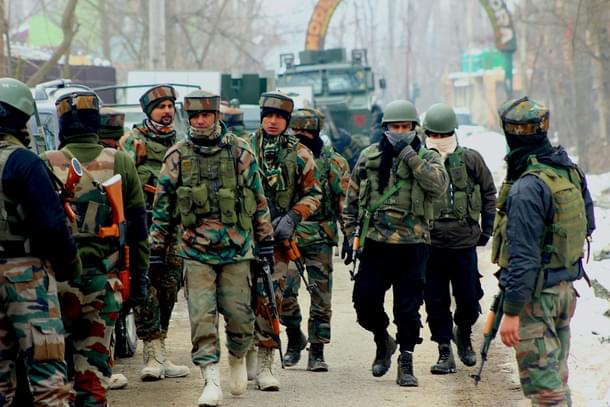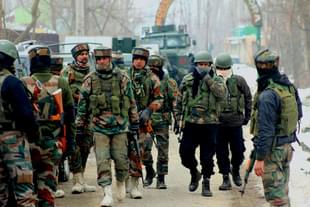News Brief
Pakistan Exploited Gaps In Jammu Region After Rashtriya Rifles Unit Was Moved To Ladakh
Swarajya Staff
Apr 23, 2025, 02:43 PM | Updated 02:43 PM IST
Save & read from anywhere!
Bookmark stories for easy access on any device or the Swarajya app.


In recent years, Pakistan's terror network in Kashmir has faced a significant challenge due to a drastic decrease in the number of local recruits joining their ranks.
This decline has forced Pakistan to adapt its strategy, seeking new ways to infiltrate terrorists into the region. Instead of relying on the traditional Line of Control (LoC) in the north, Pakistan has turned its attention to porous international borders and riverine areas in the Jammu sector, with more terrorists entering the region than before.
Intelligence reports suggest that Pakistan’s terror factories, backed by a coordinated effort from the Inter-Services Intelligence (ISI), have been working overtime to push infiltrators into Jammu.
The infiltrating terrorists have also adopted sophisticated tactics to evade detection. Gathering in small groups of four to five, they employ strategies of conservation and consolidation. This involves staying quiet for extended periods and blending in with the local population before carrying out their attacks, making it harder for security forces to identify and apprehend them in time.
Moreover, these terrorists are equipped with advanced weaponry and technology. Security forces have noted the proliferation of equipment such as M4 carbine assault rifles, night vision goggles, and highly encrypted telecom equipment, often of Chinese origin and typically used by Pakistani Army troops.
The situation was further complicated by the redeployment of security forces to address other strategic concerns. The security grid in the Rajouri and Poonch districts was weakened to some degree when some units were reassigned to the eastern Ladakh sector to counter Chinese aggression.
Reports indicate that the ‘Uniform force’ division of ten Rashtriya Rifles was taken out of counter-terrorism roles and deployed to Ladakh as tensions with China escalated.
This reduction in troop density created a vulnerability that terrorist organizations were quick to exploit. Lieutenant General BS Jaswal (retd), a former Northern Army commander, highlighted this recently, noting that troop density in areas south of the Pir Panjal range had decreased due to the redeployment.
"The terrorists want to exploit the void created by the redeployment of forces. Also, the Jammu region is reporting more terror incidents because infiltrators are looking at using ingress routes into the Kashmir valley from this side," he explained.
Pakistan capitalized on this opportunity in 2024, leading to a series of devastating terrorist attacks in the Jammu region.
On June 9, a bus carrying Hindu pilgrims from Shiv Khori to Katra was attacked, causing it to plunge into a gorge and resulting in the deaths of nine people, including seven non-local pilgrims. Just days later, on June 11/12, terrorists struck a joint check post in Kathua district, killing two foreign terrorists and a CRPF jawan, while injuring several Rashtriya Rifles personnel and a Special Police Officer in the ensuing gunfight.
The violence escalated further on July 8, when terrorists targeted a military convoy in the Machedi forest area of Billawar, Kathua district, claiming the lives of five Army soldiers. More recently, on October 20, an attack on a workers' camp near Gagangeer, Sonamarg, left seven employees dead, including a Kashmiri doctor, and five others injured.
By July 2024, India had to induct a brigade strength of around 3,000 Army troops along with 400-500 special forces personnel into the Jammu area to plug the gaps.
Moreover, earlier this month (April 2025), reports confirmed that the Rashtriya Rifles unit, absent for nearly four years, is redeploying back to its old strongholds in Rajouri, Poonch, Doda, and Kathua. This move is expected to bolster the security grid and counter the recent wave of terrorist activities from Pakistan targeting the Jammu region.





